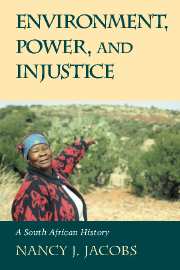Book contents
- Frontmatter
- Contents
- List of Illustrations
- List of Tables
- Preface
- Abbreviations
- 1 Approaching Kuruman
- 2 Goat People and Fish People on the Agro-Pastoral Frontier, c. 1750–1830
- 3 Intensification and Social Innovation on the Cape Frontier, 1820s–1884
- 4 Colonial Annexation: Land Alienation and Environmental Administration, 1884–1894
- 5 Environmental Trauma, Colonial Rule, and the Failure of Extensive Food Production, 1895–1903
- 6 The Environmental History of a “Labor Reservoir,” 1903–1970s
- 7 Apportioning Water, Dividing Land: Segregation, 1910–1977
- 8 Betterment and the Bophuthatswana Donkey Massacre: The Environmental Rights of Tribal Subjects, 1940s–1983
- 9 Retrospectives on Socio-Environmental History and Socio-Environmental Justice
- Appendix A South African Census Statistics on Human Population
- Appendix B South African Census Statistics on Stock Population
- Appendix C1 1991 Individual Interviews
- Appendix C2 1997–1998 Individual Interviews
- Appendix C3 1991 and 1997–1998 Group Interviews
- Appendix D A Note on Archival Sources
- Notes
- Index
3 - Intensification and Social Innovation on the Cape Frontier, 1820s–1884
Published online by Cambridge University Press: 05 July 2009
- Frontmatter
- Contents
- List of Illustrations
- List of Tables
- Preface
- Abbreviations
- 1 Approaching Kuruman
- 2 Goat People and Fish People on the Agro-Pastoral Frontier, c. 1750–1830
- 3 Intensification and Social Innovation on the Cape Frontier, 1820s–1884
- 4 Colonial Annexation: Land Alienation and Environmental Administration, 1884–1894
- 5 Environmental Trauma, Colonial Rule, and the Failure of Extensive Food Production, 1895–1903
- 6 The Environmental History of a “Labor Reservoir,” 1903–1970s
- 7 Apportioning Water, Dividing Land: Segregation, 1910–1977
- 8 Betterment and the Bophuthatswana Donkey Massacre: The Environmental Rights of Tribal Subjects, 1940s–1983
- 9 Retrospectives on Socio-Environmental History and Socio-Environmental Justice
- Appendix A South African Census Statistics on Human Population
- Appendix B South African Census Statistics on Stock Population
- Appendix C1 1991 Individual Interviews
- Appendix C2 1997–1998 Individual Interviews
- Appendix C3 1991 and 1997–1998 Group Interviews
- Appendix D A Note on Archival Sources
- Notes
- Index
Summary
Till the present system shall undergo a complete revolution, such a population can never abound in grain.
Soon after the agro-pastoral frontier engulfed the thornveld, the Cape frontier began to lap at its southern edge. As on other frontiers, the European-indigenous encounter in southern Africa involved renegotiating the ways people interacted with the environment. It is widely understood that the Cape frontier introduced Christianity and cash-based commerce to the Kuruman thornveld, but it is less often recognized that these had a definite impact on people's relations with the environment. Christianity entailed irrigated cultivation, while commerce depended on exploiting wild fauna and flora as resources, and both were challenges to existing land uses. Irrigated cultivation is sedentary and more labor intensive than the shifting cultivation practiced by the Tlhaping and Tlharo. Commercial hunting and woodcutting brought a way to accumulate wealth without investing in cattle. Clearly, these new forms of production had the potential to revolutionize social relationships. However, by no means did Christianity, commerce, irrigation, commercial hunting, or woodcutting displace older ways of thinking about and producing from the biophysical world. Irrigation and trading were grafted onto older practices of agro-pastoralism, and their revolutionary impact was muted. The fundamentals of thornveld society and production methods endured, at least until colonial annexation.
IRRIGATION AS AN INNOVATION IN PRODUCTION AND SOCIETY
Channeling water from their springs to cultivated areas was a foreign notion to people in Kuruman. Rather, they devoted themselves to making rain.
- Type
- Chapter
- Information
- Environment, Power, and InjusticeA South African History, pp. 57 - 75Publisher: Cambridge University PressPrint publication year: 2003



